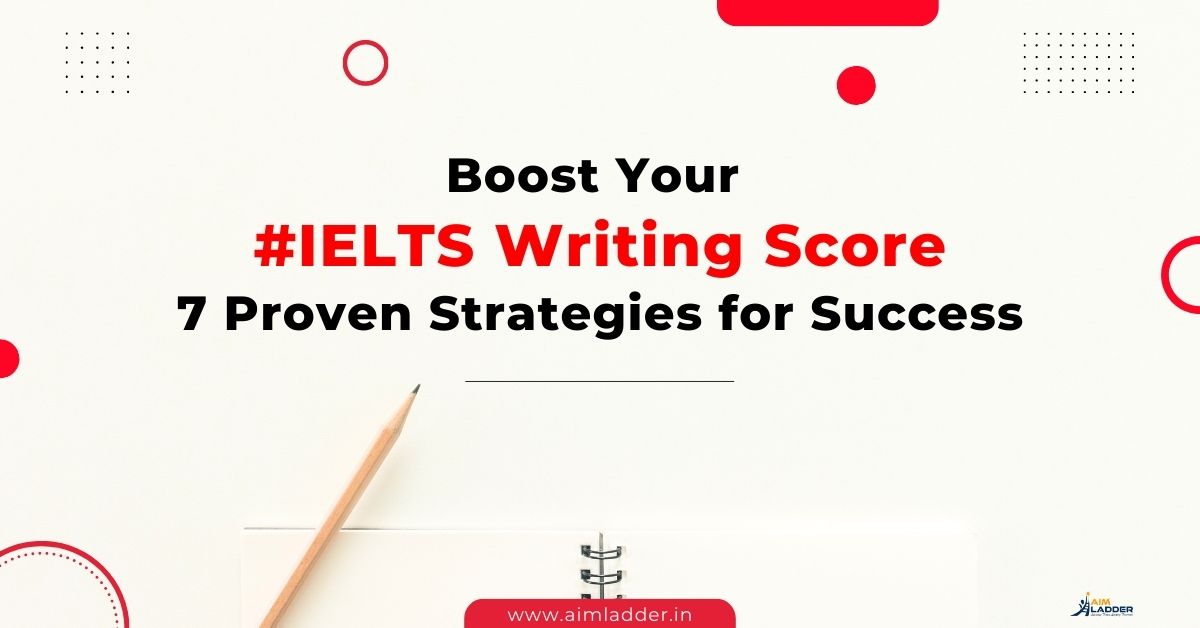- Services
-
-
Test Preparation
-
Study Abroad Services
Visitor, Tourist & Dependent Visas
-
-
-
- Study Destinations
-
-
Top Study Destinations
-
-
-
-
- About Us
- Contact Us
- Blog
Boost Your IELTS Writing Score – 7 Proven Strategies for Success
Are you looking to improve your IELTS writing score and achieve your desired results? With the right strategies and techniques, you can enhance your writing skills and make a significant impact on your IELTS performance. In this article, we will explore seven proven strategies that experts recommend to boost your IELTS writing score and pave the way for academic success.

Page Content
The writing section of the International English Language Testing System (IELTS) comes out as the most difficult module of the test. However, the right guidance from an expert IELTS trainers could help one get their desired scores. Before we jump onto the strategies that could help one ace IELTS writing, let’s understand the test format of the same.
Learn The Format For IELTS Writing
The IELTS writing module consists of two tasks. For task 1, academic students need to write a report whilst general training students write a letter. Task 2 remains the same for all candidates, they need to write an essay to showcase their ability to develop an argument or discuss a topic.
The total time you have for writing module is 1 hour. You can divide the time according to yourself though it is suggested to spend 20 minutes on task-1 and 40 on task-2 because task-1 has to consist of at least 150 words whereas task-2 must be 250 words.
Task 1 (Academic)
Here, candidates are given data through graph, chart, table or a diagram and they are supposed to summarise or describe the information in a clear, well organised manner. The format for task 1 is as followed:
- Introduction: Start off by paraphrasing the question, stating any key trends or significant points
- Body: Write an overview of the main feature or trends in the visual information. Ensure to use appropriate language while describing comparisons, contracts or any particular data.
- Details and Support: Provide details, data or examples to support your overview and ensure the accuracy of the information provided.
- Conclusion: Lastly, conclude your writing by giving a brief summary on the key points and any significant observations.
Task 1 (General Training):
There are three different types of letter given to candidates, formal, informal and semi-formal. Candidates are supposed to identify the type of letter on their own. Regardless of the type, the format of the letter generally is the same:
- Greeting: You need to start the letter with an appropriate salutation such as Dear/Respected Sir/Madam/Name.
- Introduction: Introduce yourself in certain situations and make sure to clearly state the purpose of the letter. Provide any necessary information.
- Body: Write the body of the letter into paragraph, each should address a specific point related to the given topic. Use proper tone and language for the type of letter.
- Conclusion and Sign Off: Conclude the letter by summarizing the main points and suggesting actions if needed. Ensure to use an appropriate closing phrase i.e. “Yours lovingly”. End it with your name, designation or contact information if required.
Task 2 Writing Essay
For task 2, candidates write an essay on the given topic, aiming to present a well-structured argument or discussion. The format for task 2 is as followed:
- Introduction: Start by paraphrasing the question using synonyms and giving your opinion on the topic along with an overview of what’s going to be discussed.
- Body Paragraphs: Furnish the essay into two or three paragraphs. One must be focusing on the specific main points while the other gives examples to support one specific point of view. Start each paragraphs with a main sentence that will introduce the main idea of that paragraph.
- Conclusion: In your conclusion, summarize your main points and restate your position. Make sure the conclusion does not introduce any new arguments or information.
7 Proven Strategies To Enhance Your IELTS Writing Score
- Plan before Writing: Make an outline of the key points you would like to include, decide how your piece will be structured and organized, and brainstorm supporting ideas. The goal of planning is to ensure you cover all relevant aspects of the topic in a coherent and well-structured manner.
- Paraphrase Effectively: To make your writing more readable, you need to use proper paragraphing. Every new point or idea should be introduced clearly. The examiner will be able to easily follow your argument if you present your points logically which will have a significant effect on your score.
- Write a Clear and Cohesive Response: It is essential to write a clear and cohesive answer throughout the test. You should begin by clearly stating your main point, then provide evidence supporting that point, then summarize your key points at the end. Your thoughts will flow more smoothly if you use linking words and phrases.
- Enhance Vocabulary and Focus on Grammar: To score highly in the IELTS writing section, you need good vocabulary and grammar skills. For demonstrating your language proficiency, use academic and topic-specific vocabulary. Punctuation, grammar, and sentence structure should all be considered. Make sure you don’t make frequent errors and demonstrate your language skills by using complex sentences.
- Practice Regularly: Consistent practice is the key to improve writing skills for the IELTS exam. Familiarise yourself with different types of writing tasks and attempt them within the time limit to simulate a real exam environment. In order to improve your writing style, seek the help of an experienced IELTS tutor or a native English speaker.
- Proofread and Edit: Once you’re done writing, remember to allocate some time to proofread your work and make necessary changes. Check the spellings and punctuation, ensure you’ve used a proper sentence structure and verify your ideas are clearly expressed. On finding any mistake, correct them before you finalise your writings.
Achieving a high score in IELTS writing is not very difficult, all it requires is a combination of language proficiency and some strategic approaches. Proper IELTS Coaching, Guidance, efforts and right resources could make it a lot simpler than it already is!
Get A Free IELTS Demo Session!
Our trainers will guide you through the latest IELTS strategies and help you improve your overall performance.




